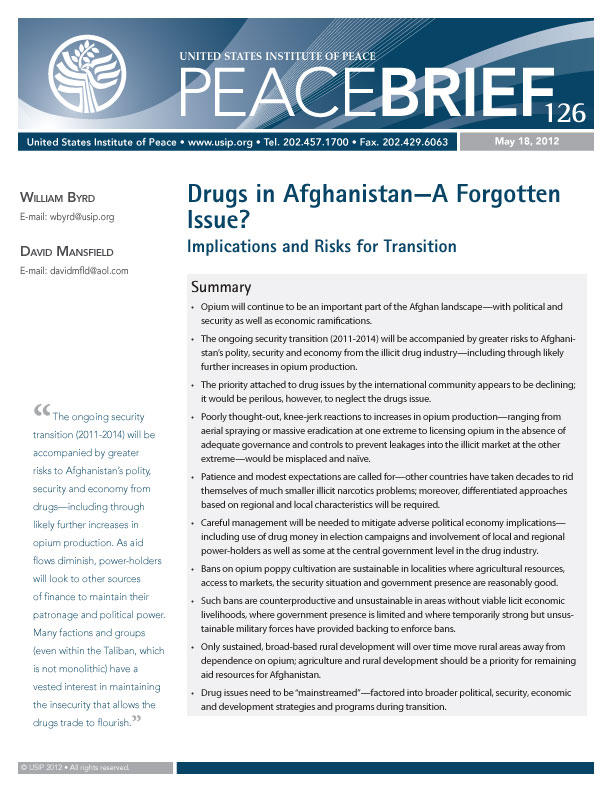This paper reflects both authors' concern that neglect of the opium economy in coming years could be perilous, exacerbate problems, possibly lead to poorly thought-out knee-jerk reactions and/or simplistic responses which would only worsen the situation, and further damage the prospects for success of what will inevitably be a difficult and challenging process of transition in Afghanistan.

Summary
- Opium will continue to be an important part of the Afghan landscape—with political and security as well as economic ramifications.
- The ongoing security transition (2011-2014) will be accompanied by greater risks to Afghanistan's polity, security and economy from the illicit drug industry—including through likely further increases in opium production.
- The priority attached to drug issues by the international community appears to be declining; it would be perilous, however, to neglect the drugs issue.
- Poorly thought-out, knee-jerk reactions to increases in opium production—ranging from aerial spraying or massive eradication at one extreme to licensing opium in the absence of adequate governance and controls to prevent leakages into the illicit market at the other extreme—would be misplaced and naïve.
- Patience and modest expectations are called for—other countries have taken decades to rid themselves of much smaller illicit narcotics problems; moreover, differentiated approaches based on regional and local characteristics will be required.
- Careful management will be needed to mitigate adverse political economy implications— including use of drug money in election campaigns and involvement of local and regional power-holders as well as some at the central government level in the drug industry.
- Bans on opium poppy cultivation are sustainable in localities where agricultural resources, access to markets, the security situation and government presence are reasonably good.
- Such bans are counterproductive and unsustainable in areas without viable licit economic livelihoods, where government presence is limited and where temporarily strong but unsustainable military forces have provided backing to enforce bans.
- Only sustained, broad-based rural development will over time move rural areas away from dependence on opium; agriculture and rural development should be a priority for remaining aid resources for Afghanistan.
- Drug issues need to be "mainstreamed"—factored into broader political, security, economic and development strategies and programs during transition.
About this Brief
William Byrd is a development economist and has worked on Afghanistan in various capacities over the past decade. During 2002-2006 he was stationed in Kabul, Afghanistan, where he served as the World Bank's country manager for Afghanistan and then as economic adviser. He is currently a visiting senior expert at the U.S. Institute of Peace. David Mansfield is an independent consultant and visiting fellow at the Feinstein International Center at Tufts University. He has conducted in-depth field research in rural Afghanistan for 15 consecutive years, and has produced numerous publications on the opium economy in Afghanistan.
This paper reflects both authors' concern that neglect of the opium economy in coming years could be perilous, exacerbate problems, possibly lead to poorly thought-out knee-jerk reactions and/or simplistic responses which would only worsen the situation, and further damage the prospects for success of what will inevitably be a difficult and challenging process of transition in Afghanistan. The views expressed in this brief do not necessarily represent the views of the U.S. Institute of Peace, which does not take policy positions.